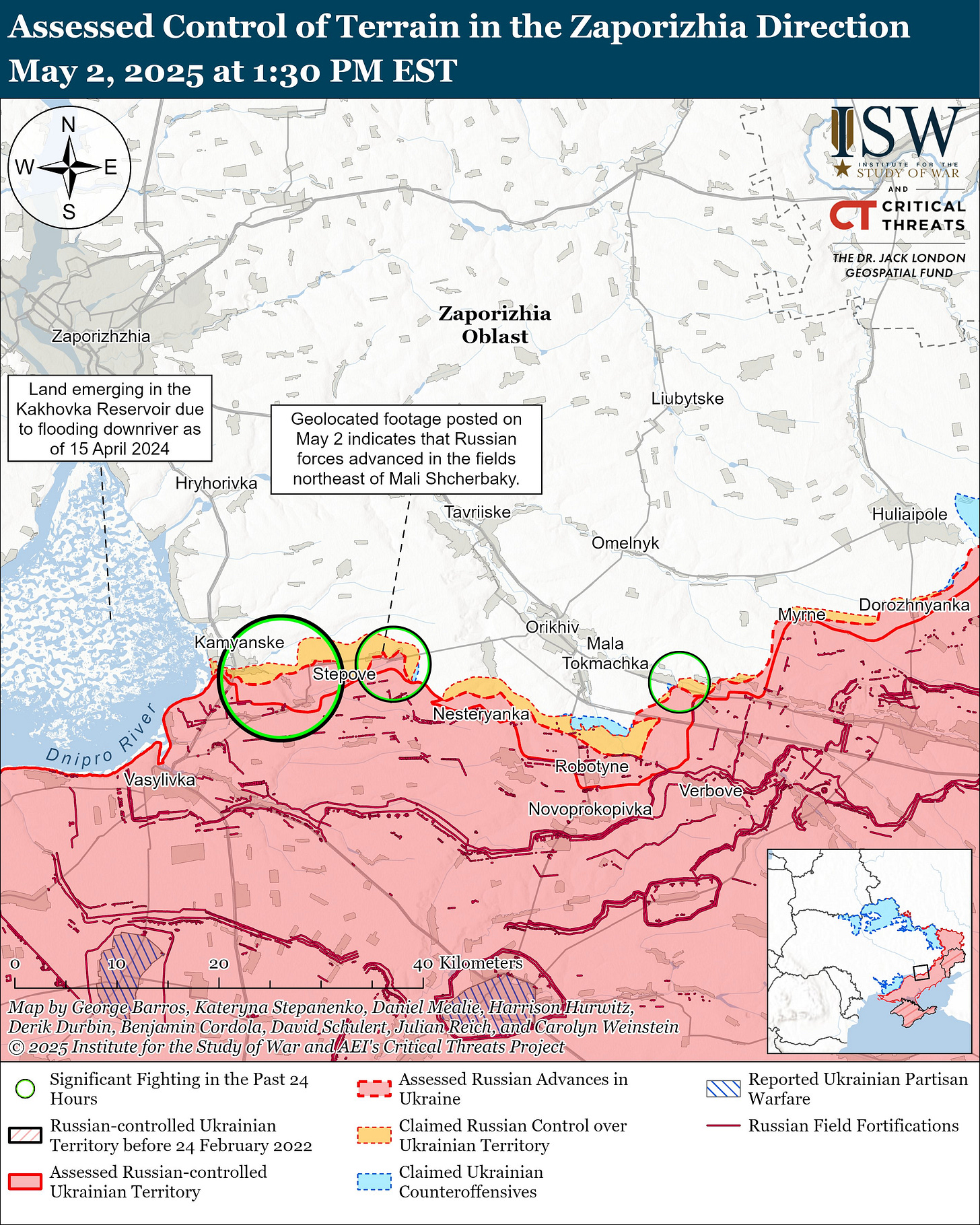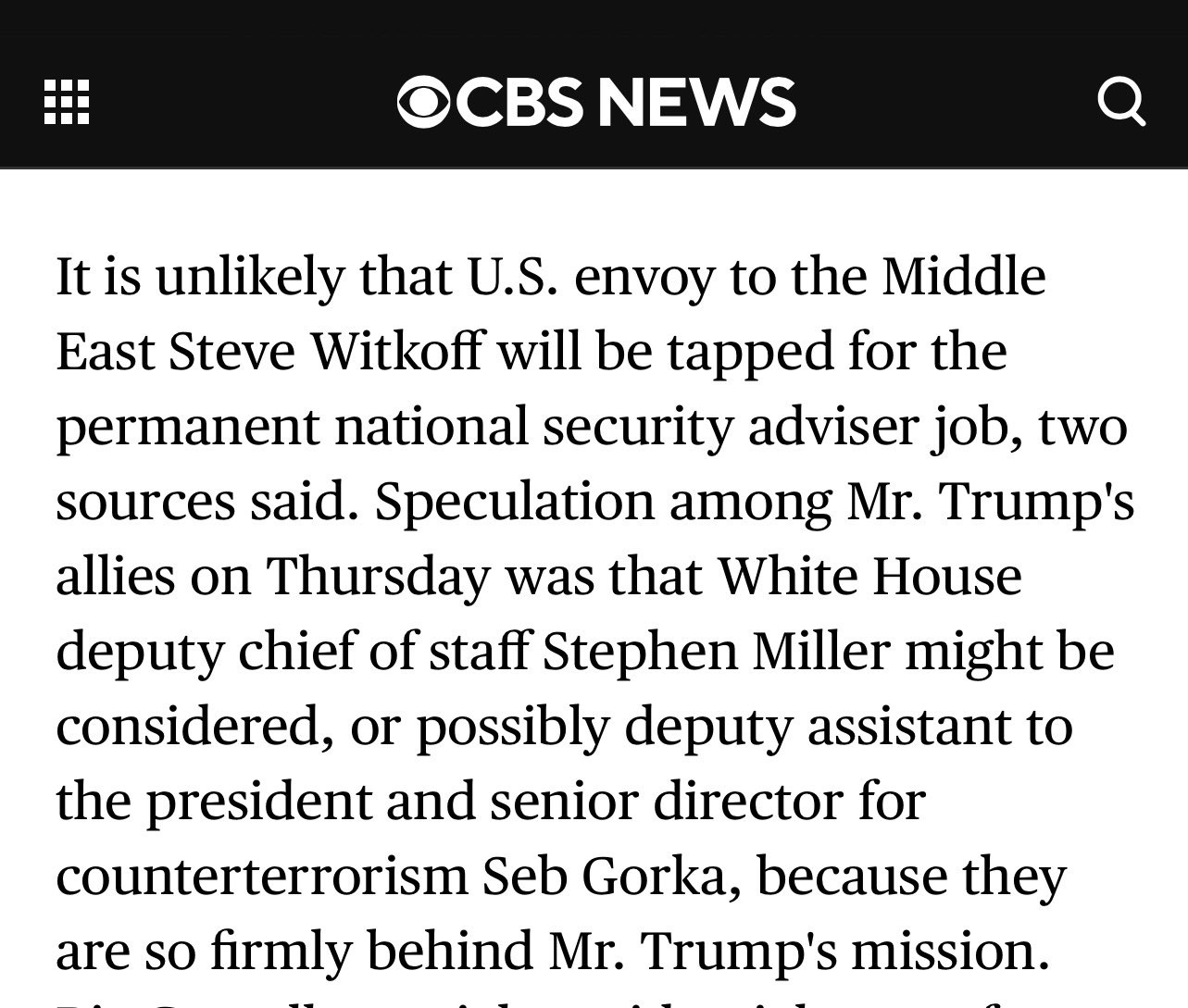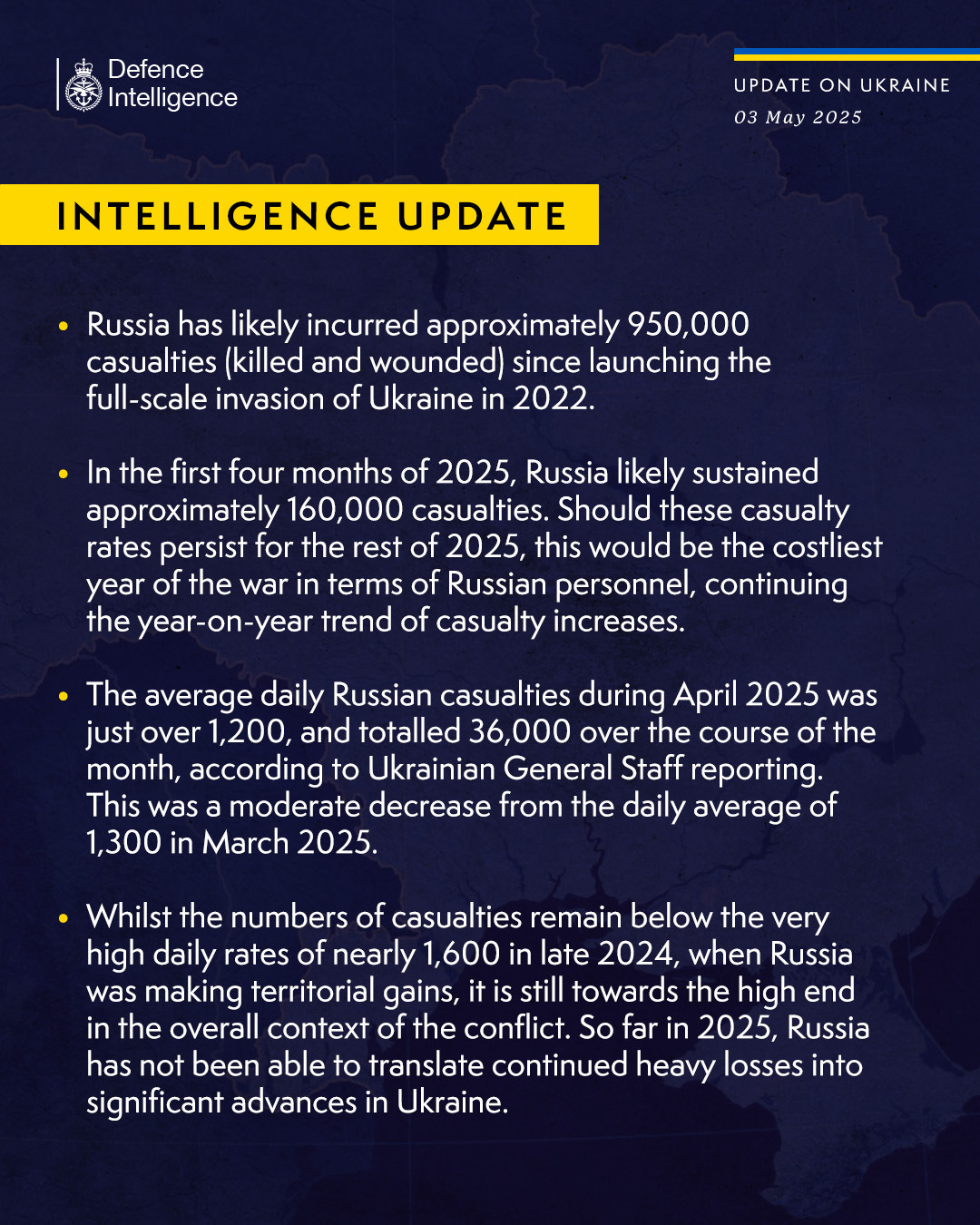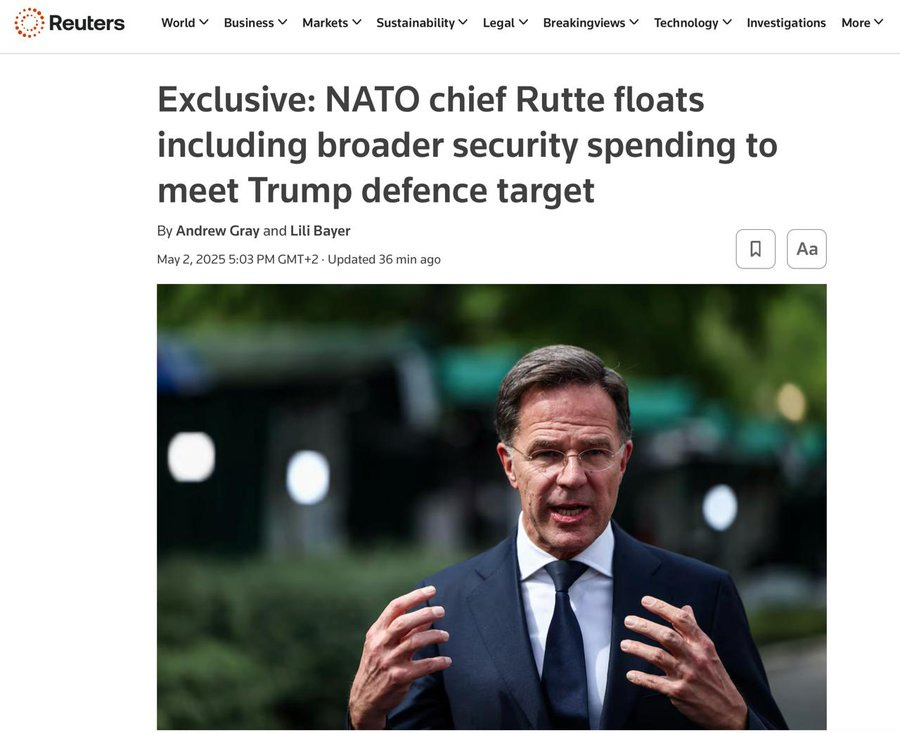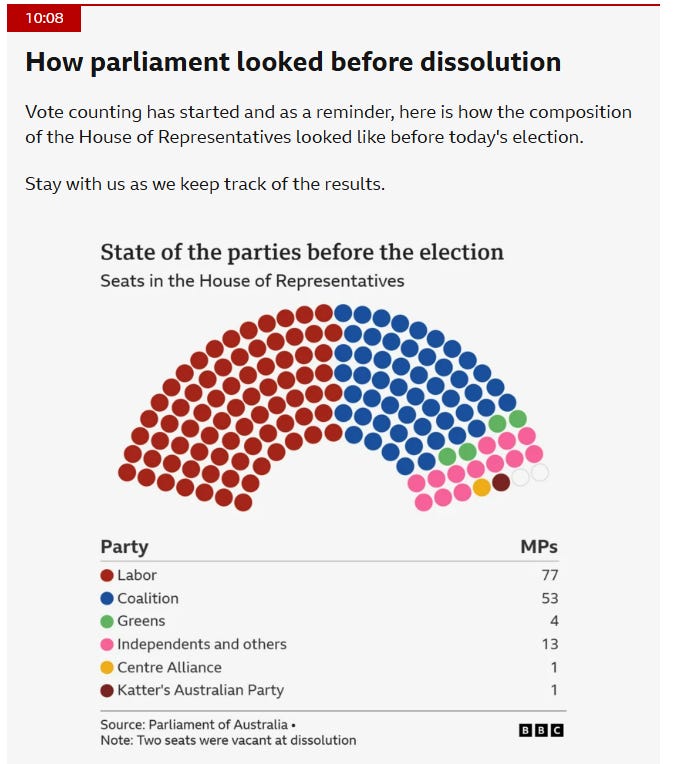May 3: E-Stories
UAKharkiv SitRep BehindLines Russia-China Europe Miller REM/RFERL NewSecAdv 5Eyes AustraliaVotes Miller ISW UKDef Farrell ChathamHouse Kazakhstan NATO Euroclear ReformUK Savage
Catching up…
For specific news about Trump, his regime and its dealings with Russia, I direct you to Olga’s substack. She and Julie Roginsky publish a weekly podcast, “Pax Americana”, which is highly informative.
For a general view of news from various geopolitical threatres, Scott’s EA Worldview is always superb.
Let’s get going…
Stories we’re following…
Kharkiv: The number of people injured in the Russian strike on Kharkiv has risen to six, local authorities report. According to the Ukrainian Air Force, on May 2, the Russian army simultaneously launched several groups of attack drones in the directions of Kharkov, Kiev, Sumy and Zaporizhia.
Zelensky on his meeting with Trump at the Vatican: "It may have been the best conversation we've ever had." He agrees with Trump that a 30-day ceasefire with Russia is the correct first step. Zelensky also mentioned, "I raised the air defense topic, and Trump said he will work on it." On the U.S.-Ukraine minerals deal, he added: "It’s beneficial to both sides, ensuring Ukraine can defend future U.S. investments."
Stephen Miller on Ukraine- US minerals deal. What is missing in this clip and in most US foreign policy statement is even the slightest hint of morals and what is right.
Combat Situation
Massive drone attack reportedly targets Russian military sites in occupied Crimea. The pro-Ukrainian Crimean Wind Telegram channel reported explosions in several key locations, including Sevastopol, Dzhankoy, Saki, Novofedorivka, and Kacha — sites that host Russian military airfields.
ISW: Russian gains along the frontline have slowed over the last four months, but Russia continues to tolerate personnel losses comparable to the casualty rate Russian forces sustained during a period of intensified advances between September and December 2024.
Putin's commitment to maintaining the tempo of offensive operations despite diminishing returns underscores Putin's ongoing efforts to leverage further battlefield gains to generate pressure on Ukraine in ceasefire and peace negotiations or otherwise to force Ukraine's collapse.
US confirms sending decommissioned F-16s to Ukraine for spare parts support. According to an Air Force spokesperson, the U.S. Department of the Air Force "has supported the sustainment of European-donated F-16s to Ukraine by providing disused and completely non-operational F-16s to Ukraine for parts."
Behind the Lines
The U.S. State Dept has approved a $310M deal for F-16 training, maintenance & support for Ukraine—including upgrades, parts, & ground equipment. This comes days after a Trump-backed U.S.-Ukraine minerals & investment deal.
Trump's team prepares economic options against Russia, Bloomberg reports. The sources told Bloomberg that U.S. President Donald Trump is yet to make a decision, as diplomatic efforts to end the war are still underway.
The United States has begun sharing classified intelligence data on Russian and Chinese space activities with its Five Eyes alliance allies – Britain, Canada, Australia and New Zealand. As reported by The Times , this decision was unprecedented: previously, the activities of the specialized unit of the American Space Force – Space Delta 9 – remained exclusively at the disposal of the United States itself and were accessible only to those with the highest level of access to state secrets. That includes providing partners with access to sensitive information about Russia’s and China’s growing space activities. Horn said the allies will be able to share data to help Washington identify and mitigate vulnerabilities in orbital defenses, and the U.S. will in turn share some of the critical intelligence it has accumulated over the past decade.
WSJ: Europe Is Racing to Build Its Own Version of the U.S. Military-Industrial Complex
Because European countries slashed military budgets a lot more than the U.S. after the Cold War, their domestic defense suppliers became niche, low-volume producers with high unit costs. Airbus’s military arm was the highest-grossing one in 2024 with €12 billion in revenue—barring BAE Systems , which gets half its sales from the U.S. By contrast, Lockheed grossed $71 billion.
This has created a negative feedback loop, with NATO members increasingly channeling off-the-shelf purchases toward American contractors, which remain capable of large-scale production. Following Russia’s invasion of Ukraine, only 22% of the EU’s procurement boost remained in Europe, according to the European Commission.
The clear, first step to fix this is producing more of what Europe already makes: ammunition. After the EU failed to deliver one million artillery shells to Ukraine by March 2023—it took until November—officials in the bloc allocated €500 million to scale output. A quarter went to Rheinmetall , which targets output of 1.1 million 155mm shells a year by 2027, and tripling annual revenue to €30 billion by 2030.
Chatham House’s Independent Thinking podcast: Ukraine’s impossible choice
As President Trump floats a controversial peace deal that could leave Ukraine facing territorial losses and NATO exclusion, Kyiv is forced to weigh an impossible choice between sovereignty and survival. Bronwen Maddox speaks with Orysia Lutsevych from Chatham House and Matthew Savill from RUSI about battlefield fatigue, shifting alliances and the future of European security.
Meanwhile in Russia & China…
In a surprising move the Kazakh authorities have banned four current members of the Russian State Duma and one former Russian parliamentarian Deputy Speaker of the State Duma Pyotr Tolstoy, First Deputy Chairman of the Duma Committee on International Affairs Vyacheslav Nikonov, United Russia deputies Yevgeny Fyodorov and Konstantin Zatulin, as well as the head of Rossotrudnichestvo and former State Duma deputy Yevgeny Primakov from entering the country, Deutsche Welle reported, citing a source in the republic's government.
Tolstoy has previously stated that after Ukraine, Kazakhstan could be Russia’s “next problem.” He also called Almaty “the city of Verny, built by Russians,” and accused Kazakhstan of trying to “invent its own history” to distance itself from Russia. Nikonov, speaking on federal television, said that “Kazakhstan simply did not exist,” describing the territory of modern Kazakhstan as “a gift from Russia and the USSR.”
Mo: Kazakh officials had banned Russian Duma members in the past if they had disrespected the state in some way, and this list is not complete as there are other officials as well.
Kazakhstan is deeply tied to Russia in terms of finance and economics and became much more so after Russia’s full-scale invasion of Ukraine, providing fertile ground to open businesses to skirt the Western sanctions regime. The fact that they have taken this decision is actually quite surprising and I’ll be contacting sources to find out more about it.
In the EU…
NATO chief Rutte proposes raising defense spending to 5% of GDP — up from the current 2%. His plan: 3.5% for direct defense, 1.5% for related infrastructure like cyber and transport. A move to bridge U.S. demands and European realities.
NATO Secretary General Rutte is proposing a new spending formula in the Alliance to satisfy Trump: increasing defense spending to 3.5% of GDP. And another 1.5% for broader security-related spending.
Belgium's Euroclear to redistribute $3.4 billion from frozen Russian assets, media reports. The payout, drawn from a pool of 10 billion euros ($11.3 billion) in cash frozen under EU sanctions since Russia's full-scale invasion of Ukraine, comes in response to Russia's confiscation of billions in Western-held assets over the past year.
Nigel Farage, the Reform UK leader, has claimed that these elections mark “the beginning of the end of the Conservative party”.
[This is] the beginning of the end of the Conservative party. They may well have been around since 1832 and the Great Reform Act, but they’ve been wiped out in the shires of England, wiped out in those West Midlands, southern, south-western areas where they’ve got their members, they’ve got their councillors, they’ve got their base, they raise the money. They all frankly cease to exist.
And they now become an obstacle. Because what is perfectly clear, given those mayoral contests in both Donny [Doncaster] and indeed North Tyneside, is that whilst we clearly are the main challenges to Labour in the Midlands and the north, if you vote Conservative you stop our chances of winning. If you vote Conservative, you get Labour.
But if you vote Reform in the Midlands and the north, from now up until the general election, you get Reform.
In other news…
Australia Votes: This is what the parliament looked like prior to the vote. At the time of this writing, we’re awaiting results. Voters will also be deciding on the Senate.
Labor has achieved an emphatic win, with strong swings for the party across all states and territories. Labor has secured majority government, securing at least 86 seats. Peter Dutton has lost his seat of Dickson to the Labor challenger, Ali France. Dutton apologised for the result, conceding “it is not our night”, as Liberal party faithful say there will need to be a hard look at what went wrong for the LNP, which recorded a historic loss.
Kevin Bonham: The overall picture of a landslide re-election for the Albanese Labor government, the first federal government to serve a full first term and then increase its majority, is clear enough, but just a note on seats in doubt.
The Greens are celebrating their “highest ever vote in history”, despite having lost two seats in Brisbane, and suffering a swing against them in Adam Bandt’s seat of Melbourne.
Azerbaijani lawmaker blames Russia for February cyberattack. Russia was behind the February cyberattack on Azerbaijani media, Ramid Namazov, head of the Azerbaijani parliament's commission on countering hybrid threats, said on May 2, the APA news agency reported.
Mila Tanghye, Going, Going . . .? The US Base Network in Europe
It is not yet clear what the Pentagon plans, and the adjustments could range from moderate to extensive. At the furthest end of possible options, the officers said the effects would be very serious. Admiral (Ret.) James Foggo said enemies would see base closures and troop withdrawals as signposting a downgrading of the US from global to regional power status; Lt. Gen. (Ret.) Ben Hodges said Russia would judge the US can’t protect Europe, or no longer cares; Lt. Gen. (Ret.) Stephen Twitty said it would mean a substantial loss of strategic depth and indicate the US is walking away from peace and security on the continent; and Maj. Gen. (Ret.) Skip Davis said any major pull-out would make US power projection slower, costlier, and less effective.
The Pentagon says it’s currently taking “a hard look” at where forces are stationed. On April 9, it was announced that the US would cut costs by moving most of its personnel from Jasionka in southeastern Poland, the main logistics base for arms shipments to Ukraine. Meanwhile, NBC News reported on April 8 that up to 10,000 US troops would be withdrawn from Poland and Romania.
As of early 2025, there were roughly 84,000 US service members across the United States European Command (EUCOM) area of responsibility, including troops deployed after Russia’s 2022 invasion of Ukraine.
Michael Savage, A cocktail for a misinformed world’: why China and Russia are cheering Trump’s attacks on media
For many senior media figures around the world, there has been a tipping of the scales as authoritarian regimes are emboldened by a US administration not only attacking the media at home, but also withdrawing from the fight for free information overseas.
As the world marks Press Freedoms Day on May 3, observers are now warning that in countries where free media is weak, America’s withdrawal from this geopolitical balancing act will have far-reaching effects.As well as VOA, which was founded in 1942 at the height of the second world war and broadcasts in nearly 50 languages, Trump has withdrawn funding from Radio Free Europe/Radio Liberty (RFE/RL), which was founded during the cold war and broadcasts to countries including Belarus, Russia and Ukraine.
The head of the US-funded Arabic-language news outlet Alhurra, Jeffrey Gedmin, has said the decision to cut its staff and services would “silence America’s voice in the Middle East”.



